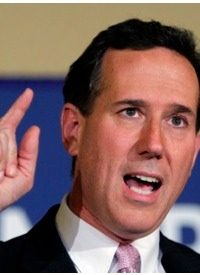
Yes, Santorum really believes he’s a conservative — or at least he wants voters to believe it.
The problem, of course, is that his record belies his claim to conservatism, a point one of his rivals, Texas Rep. Ron Paul, has made repeatedly during the campaign. Paul, also vying for the mantle of “the conservative alternative to Romney,” called Santorum a “fake” conservative both in a campaign ad and in person during one of the debates. He pointed to numerous Senate votes in which Santorum had acted in ways that violated the Constitution, the idea of limited government, and just plain good sense.
Reminding Santorum that his record doesn’t match his rhetoric obviously gets under his skin. At a recent campaign appearance, someone in the crowd shouted to the former Senator as he passed by: “Explain why you voted for No Child Left Behind, Medicare Part D, and five debt ceiling increases. What’s ‘limited government’ about that?”
Santorum, visibly perturbed by this line of questioning, turned to the man and shot back: “Vote for Ron Paul. That’s what you should do.”
{youtube width="500" height="281"}G106jlvZYmQ{/youtube}
Undoubtedly Santorum recognized these as some of the talking points included in Paul’s attacks on his record. They also all happen to be instances in which Santorum did indeed violate his professed conservative principles — something even he has conceded with regard to two of them.
Santorum voted Yea on the 2001 No Child Left Behind Act (NCLB), a law that vastly extended federal control over local schools in clear violation of the 10th Amendment. NCLB was one of President George W. Bush’s pet projects and passed the Senate with overwhelming Republican support. In the same debate where Paul called him a “fake,” Santorum admitted he “made a mistake” in voting for the law, but he defended his vote by saying “politics is a team sport” and “when you’re part of the team, sometimes you take one for the team” — a rationalization that did not sit well with the audience.
He also helped pass Medicare Part D, which provides for subsidized prescription drug purchases for senior citizens. Now that it has become obvious that the program is a fiscal disaster, putting taxpayers on the hook for some $7.2 trillion in unfunded liabilities, Santorum says that his vote for that law, too, was “a mistake.” Yet anyone who considers himself a conservative should have opposed it on both constitutional and fiscal grounds to begin with: The program was, at the time of its passage in 2003, the largest new entitlement since the Great Society era of the 1960s.
Santorum did vote to raise the debt ceiling five times during his tenure in the Senate. He defended this obvious fiscal irresponsibility on the grounds that the debt-to-GDP ratio fell slightly during that same time period, which is true but irrelevant. The government was already deeply in debt, and Santorum’s votes to allow it to take on more red ink only exacerbated the problem. Had Santorum and other self-proclaimed conservative Senators and Representatives stood their ground and forced the government to live within its means, America would not now be facing the dire financial future that it is.
Many more examples of Santorum’s failing to live up to his professed principles could be adduced. (The New American has documented quite a few of them.) Perhaps this is why the Senator has run from his record at least as much as he has run on it.
However, as the video demonstrates, Santorum knows the one man in the race who can confidently run on his own record, certain that it proves that he is the limited-government constitutionalist that he claims to be. According to Santorum, if you want a President who really believes in binding the government down by the chains of the Constitution and has consistently voted that way in Congress, there’s only one option: “Vote for Ron Paul.”
Related article:

